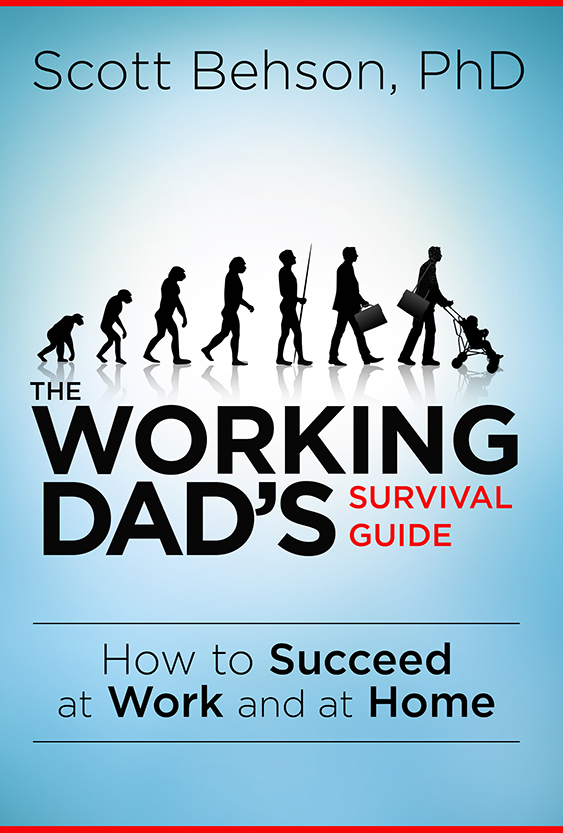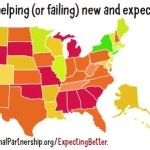Q&A with Scott Behson, author of The Working Dad’s Survival Guide
More companies are starting to offer paternity leave to new fathers. Why is paid paternity leave important for all families?
I know it was transformative for my family. Because my wife and I were both home to transition to life with our brand-new son, we both became competent and confident parents while becoming confident in each other. This set a pattern that remains to today- a pattern in which we are equal parents, we can rely on each other as we both pursue our careers, and my son feels equally well cared for whether it’s with mom, dad or both of us. Having the time both to bond with my son and grow as a person and a parent was one of the greatest gifts of my life.
However, I am incredibly lucky. With no federal mandate for parental leave, most dads (and moms) are dependent on their employer. Only the fortunate 15% of have employers that provide paid paternity leave- the rest must rely on unpaid time, accumulated vacation days, or must be back at work immediately. This obviously hits those at the lower rungs of the economic ladder the hardest. And even for the lucky few, corporate culture and unsupportive managers often puts dads in the bind in which they have paternity leave available to them, but taking more than just a little bit can torpedo their careers.
All this being said, paternity leave should be seen as the ultimate win-win solution. There’s lots of research to show that kids benefit from dads who are involved in their lives from the start- they do better in school, are healthier, get into less trouble, etc. Moms benefit by becoming more able to share parenting in the home and to return to work with more confidence, avoiding “mommy tracks” and other penalties associated with interrupting one’s career for family. Companies benefit in terms of being able to attract and retain better talent.
What are the benefits for fathers in taking paternity leave?
In addition to the benefits to kids, moms, families and employers, paternity leave is amazingly good for dads themselves. Fathers consistently report that meaningful involvement with their children is their most important source of well-being and happiness.
Paternity leave helps set a pattern of more paternal involvement, which leads to closer long-term relationships with children. Research also shows that involved fatherhood makes men happier and healthier. Involved dads live longer, have fewer mental and physical health problems, are less likely to abuse drugs, are more productive at work, and report being happier. In addition, men who are fathers are more likely to be involved with their neighbors, regularly attend religious services, and volunteer in their communities.
Anecdotally, being a father is the very heart of my life. Part of why I advocate so strongly for working dads (and wrote a book for us!) is that I want all dads to be able to experience the joys of involved fatherhood.
What would you say is the one thing holding dads back from taking paternity leave offered to them and what is your response to them?
As mentioned earlier, many career-driven dads in intensive workplaces such as tech, finance, law, or consulting, face a dilemma in which they are offered generous parental leave and workplace flexibility policies (for example, EY offers 16 weeks and Bank of America 12 weeks of paternity leave). However, workplace cultures still stigmatize involved fathers and other workers who don’t constantly signal that they are 100% more devoted to work than the rest of their lives. Happily, things are starting to change as more companies are embracing work-life balance for all their employees – including fathers – but it will take some time for culture to catch up to policy.
In the meantime, I advocate that dads who have a track record of good performance and job security need to be more visible in signaling the importance of fatherhood. After all, being a great employee and a great dad is not mutually exclusive. Dads can do this by role-modeling, and, especially if they are managers, by being seen by others working flexibly, taking leave, and just talking about family. By taking paternity leave and talking about it, you make the situation better for the next dad. And, in a career that will last 45 years, 4 weeks shouldn’t have that much of an impact, but can help set up a healthy family dynamic.
Those without this security may need to lay low for now, but should keep their resumes at the ready, with an eye to finding a better situation.
Your book, The Working Dad’s Survival Guide: How to Succeed at Work and at Home helps fathers navigate the balance of a successful career and being a present father. What would you say is the most important change men need to make in their life in order to succeed at both once a child comes along?
I wrote the Working Dad’s Survival Guide to provide my fellow dads the advice and encouragement they need to make changes in their lives that will pay off at work and at home. But it starts with taking the time to assess your priorities in all the aspects of your life. Once you do so, there are literally hundreds of changes you can make in your life to starting living closer to your priorities. Some, like time management, can be easy changes. Others, like financial and career transitions, may require long-term planning. The good news is that the Working Dad’s Survival Guide can help men make these self-assessments, and then provide specific, actionable advice on how to follow through.
Finally, what is the one thing you would tell a company considering implementing or extending a paid paternity leave policy for their employees?
I would tell them that change is coming whether they like it or not (New York just became the 4th state to implement paid parental leave). They can either grudgingly comply at the same time as the rest of their competitors, OR they can get ahead of the curve and implement policy with authentic commitment. If they do the latter, they will reap the benefits in terms of attracting and retaining key employees, and having a more engaged, less stressed workforce. Survey after survey shows that men look for family-supportive policies when evaluating employers, and that these considerations are particularly important for millennials.
Finally, speaking from my own experience working with companies, so many are now seeing their male employees in their “prime parenting years” leaving because they can’t keep working there while being the dads they want to be- the classic dilemma career women have been facing for decades is now affecting men. Businesses are starting to take notice and are taking the initial steps they need to address these concerns.
From what I see, I’m very optimistic that both public policy and employers are increasingly recognizing the need to support all working parents and things will be significantly better just a few years down the road.
Scott Behson, PhD, is a professor of management at Fairleigh Dickinson University, a national expert in work and family issues, and was a featured speaker at the recent White House Summit on Working Families at at the United Nations. He’s the author of the forthcoming book, The Working Dad’s Survival Guide: How to Succeed at Work and at Home, the first book of its kind to provide advice and encouragement for working fathers, helping them to achieve success in their careers while also being the involved, loving dads they always wanted to be. Scott founded and runs the popular blog, “Fathers, Work, and Family,” dedicated to helping working fathers and encouraging more supportive workplaces. He writes regularly for the Harvard Business Review Online, Huffington Post and the Good Men Project, and has also been published in TIME and The Wall Street Journal. He frequently appears in media, including MSNBC, NPR and Fox News. Scott also has worked with Fortune 500 companies as a consultant and speaker, and has served as a keynote speaker at major events.









Comments (0)